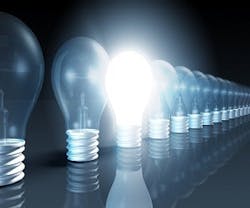America’s Next Top Energy Innovator
U.S. Energy Secretary Steven Chu has announced the “America’s Next Top Energy Innovator” challenge, designed to give start-up companies the opportunity to utilize and license revolutionary technology developed by national laboratories for $1000.
To facilitate this effort, the DOE is reducing the cost and paperwork for start-up companies to acquire option agreements to license some of the 15,000 patents held by 17 national laboratories.
"America's entrepreneurs and innovators are the best in the world," says Secretary Chu. "Today, we're challenging them to create new businesses based on discoveries made by our world-leading national laboratories. Because we've cut the upfront fees and reduced the paperwork, we'll make it easier for start-up companies to succeed and create the new jobs our economy needs. Our goal is simple: unleash America's innovation machine and win the global race for the clean energy jobs of the future."
Details per the DOE for “America’s Next Top Energy Innovator” are as follows:
- On Monday, May 2, 2011, the Department will kick off the challenge by posting a streamlined template option agreement online for entrepreneurs to submit to laboratories. Entrepreneurs must identify the technology of interest and submit a business plan to be considered for the program. Participants will have until December 15 to make their submission to the laboratory.
- Any of the 15,000 unlicensed patents and patent applications held by the national laboratories will be available for licensing by startup companies.
- From May 2 to December 15, the Department will reduce the total upfront cost of licensing DOE patents in a specific technology to a $1,000 upfront fee for portfolios of up to three patents. This represents a savings of $10,000 to $50,000 on average in upfront fees.
- Other license terms, such as equity and royalties, will be negotiated on a case by case basis and will typically be due once the company grows and achieves wide scale commercial success. These fees help support the Department's continuing research activities to develop new technologies.
- The Department will simplify the licensing process and establish a standard set of terms for start-ups, who generally lack the resources, time, or expertise to negotiate individual licensing agreements. This will significantly reduce both the time and cost required to process the license, allowing faster access to the Department's patents and enabling the Department to process more licenses in a shorter amount of time.
- Entrepreneurs who complete the process and demonstrate progress toward executing their business plan and commercializing the technology will have the opportunity to be showcased at the 3rd Annual ARPA-E Energy Innovation Summit in 2012, which brings together leading technology startups and clean energy investors from around the country.
Top 10 ENERGY STAR Cities 2010
